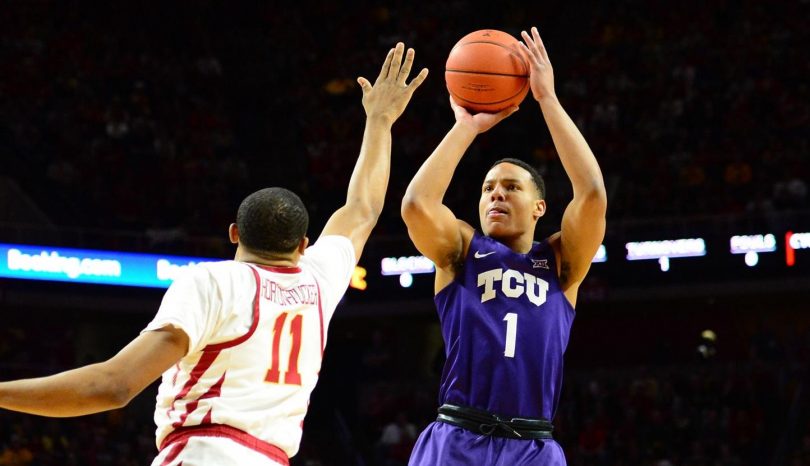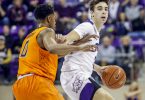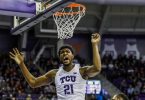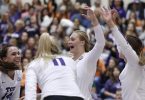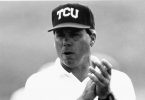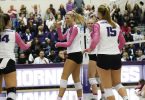TCU guard Desmond Bane came close to turning pro this spring. Had coach Jamie Dixon left for another job, it would have happened.
“For sure. I would have stayed in,” said Bane, who submitted his name for the NBA draft but instead will watch the event this week as only an interested observer, a college player preparing for his senior season at TCU, not a stressed bundle of nerves sweating out every pick.
“I probably wouldn’t have wanted to play for somebody else, unless Coach (Ryan) Miller would have gotten the job. If not, I would have stayed in the draft,” Bane said in an interview with PressboxDFW.com. “I would have probably taken a two-way contract and just tried to grind my way into the league.”
Dixon announced April 9 on Twitter he was going nowhere, a commitment that played a part in Bane’s decision to return to school. When Dixon’s name first became linked to UCLA nine days earlier, the TCU guard initially thought his coach was gone.
“For a second. But I knew,” Bane said. “I feel like if the deal was going to get done, it would have gotten done right away. Once it was taking time, I was like, ‘He’s staying.’”
Like Dixon, Bane will enter his fourth season at TCU, a member of the coach’s first recruiting class to Fort Worth and now the Horned Frogs’ most experienced player in 2019-20. Bane can still think NBA. But first, there will be another run in Big 12 and a bid for more self-improvement.
In submitting his name for evaluation for the draft and participating in the NBA Combine, Bane learned what steps remain.
“A lot of people liked the way I can shoot the ball and rebound and guard,” Bane said. “Cleveland told me they want to see me be able to make one or two change-of-direction moves when I get in the lane . . . I thought I played really well. I feel like if a few things had gone a little bit differently, I would have been in a little bit better situation. But I think I did really well and I put myself on the radar for next year for sure.”
Bane said his measurables were fine and there were no drawbacks to investigating his pro potential. He talked to Kenrich Williams, Dixon, assistant coach Miller and others about the pros and cons of a pro evaluation.
“Really, no drawback to it unless you’re not ready to put your name in and then you go to these workouts and look bad,” he said. “First impressions are everything. So I think it was the right timing, the right thing to do, to put my name in. I got some good feedback.”
Bane said when teams laid out a path for him that could include playing overseas or in the G-League, another year in the Big 12 stacked up as an equally good option, particularly with Dixon’s return.
“I just felt like I was really selling myself short not coming back to school, given that, worst case, I’d be in the same position I’m in now,” the guard from Richmond, Ind., said. “I feel like either route would have been good. But developing here is just as good, or better, as the G-League, I’d say, honestly. The Big 12 is probably the third-best league in the world behind the NBA and EuroLeague. You’re playing against NBA players almost every time you step on the floor.”
So a senior season at TCU is no comedown for Bane. When he first stepped foot on campus, it’s fair to say he didn’t even picture himself as a potential NBA. In fact, he hardly pictured himself as a college player. At least a high-major college player.
“I didn’t really think I would play at this level until probably after my freshman year of college,” Bane said. “Even then, I really didn’t know. But after that, I kind of figured out I could do some special things at this level.”
One of those special things occurred on March 9, 2017, in the quarterfinals of the Big 12 tournament, when the then-freshman made three free throws with two seconds left to sink top-ranked Kansas. Bane went on to start the final four games of the NIT, helping TCU win its first postseason tournament.
As a sophomore, the guard led the Big 12 in 3-point shooting — the first Frogs player in 19 years to lead a conference in that department — and put up 27 points in a game at Iowa State.
As a junior, Bane set a TCU record for minutes with 1,315 and ranked fourth in the league in scoring. His 34 points at Texas were the most by a TCU player in seven seasons, and he pumped in a 30-point game against Nebraska in the NIT.
“This was my only high-major offer,” Bane said, remembering his road to Fort Worth. “I didn’t know what to expect. Only mid-majors were recruiting me. When that happens, you’re kind of like, ‘Well, am I a mid-major player?’ And TCU got me so late, I thought they were just trying to fill a roster spot with me. I ended up playing a lot. After the NIT run, I said, ‘I can do it.’”
Now Bane enters a final season as the undisputed leader of a team that lost four major contributors — guards Alex Robinson and Kendric Davis and forwards Kouat Noi and JD Miller. Bane is charged with shaping up a new-look TCU team that includes returners Kevin Samuel (who also submitted and withdrew his name in the draft process), R.J. Nembhard, Lat Mayen and Russell Barlow plus a raft of newcomers headlined by four-star guard P.J. Fuller, Argentinian point guard Francisco Farabello and graduate transfers Jaire Grayer (George Mason) and Edric Dennis (UT Arlington).
“It’s got a chance to be the most talented team we’ve had,” Bane said. “Speed, athleticism, really versatile. They’re tough. We’re really fast. Just talking to our coaches and some of the guys who have been around, they’re looking in there and saying we’re a really fast and athletic team. We can shoot it. It’s going to be fun. Really, just trying to rally those guys together and show these guys what it takes to play in the Big 12 and win games in the Big 12.”
Bane sounds like a coach. No surprise. Dixon has rubbed off on him.
“Just the way he coaches — toughness, physicality — I wouldn’t say I never had that, but he put a lot of that into my game,” Bane said. “It helped me flourish as a player. A lot of these young guys, even myself coming in, I didn’t know exactly what it took or how hard you have to play or what kind of edge you have to play with. He taught me that right away.”
Now, for one more season, coach and player can mutually benefit. Now that they’re both staying.

